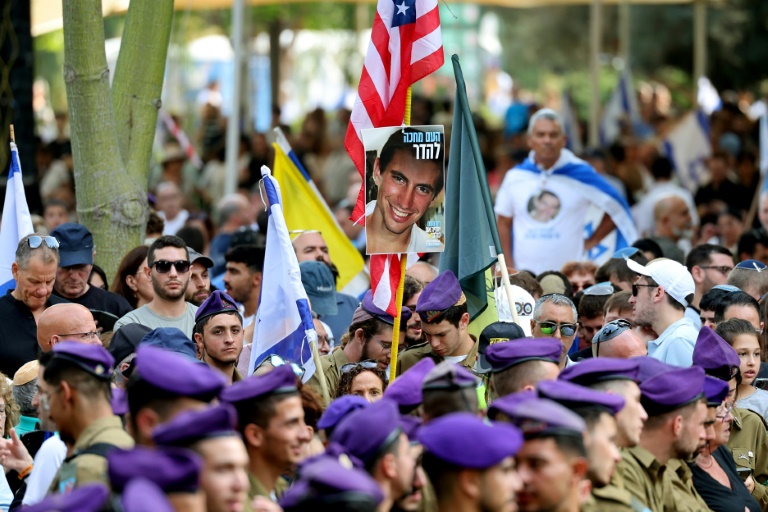Hundreds of Israelis bid farewell to army officer Hadar Goldin, who was laid to rest Tuesday in the central town of Kfar Saba after Hamas returned his remains more than a decade after his death in Gaza.
Crowds packed the military cemetery, with some climbing onto rooftops to glimpse the funeral, while others filled the streets and watched from a large outdoor screen.
Blue-and-white Israeli flags fluttered in the wind, as mourners held the young lieutenant’s portrait alongside a homemade banner reading: “We will remember forever.”
Israel received Goldin’s remains on Sunday as part of an ongoing Gaza ceasefire deal brokered by US President Donald Trump.
His father, Simcha Goldin, hailed his son as a “Jewish warrior”, while urging tearful mourners to “behave righteously and do not hate one another. That is Hadar’s legacy.”
“I ask you to act the same way, and to let there be a little more of Hadar in our daily lives,” he said
Hadar Goldin, 23, was killed on August 1, 2014 during a previous Israeli offensive in Gaza known as “Operation Protective Edge”.
He was leading a mission to destroy Hamas tunnels when he was killed in an ambush in Gza’s southern city of Rafah, and his body seized just hours into a short-lived humanitarian truce.
On Tuesday, soldiers wearing the green uniforms and purple berets of Goldin’s Givati Brigade carried his flag-draped coffin into the cemetery.
His return closes an agonising 11-year ordeal that haunted both his family and the nation.
– Leave no one behind –
“Today is a hard day, but I am happy because Hadar’s coming was a dream,” Israel Blumshtein, a 76-year-old resident of Kfar Saba, told AFP, adding that he had kept a picture of Goldin in his car for six years.
He said it was important that his body be returned “because in our army… we do not leave anyone anywhere”.
Goldin’s twin brother, Tzur Goldin, said Hamas’s hostage-taking sought “to weaken Israeli society, which is built on family”.
“It aims to set one family’s interests against those of the whole, to force us to decide who matters more or less, to privilege one value over another, to destroy us from within,” he continued.
“Our victory, for everyone, will be to ensure the founding principle of Israeli society — not abandoning one another, leaving no one behind — remains intact.”
At the end of the funeral, the crowd joined in singing a mournful rendition of the Hatikvah (The Hope), Israel’s national anthem.
Goldin’s family held a symbolic funeral in 2014 after parts of his body were recovered from a tunnel soon after his death, but repeated attempts to retrieve the rest of his remains through previous prisoner exchanges failed.
The head of Israel’s National Center of Forensic Medicine, Chen Kugel, told AFP that Goldin’s return gave “a sense of closure, for the family… but also for the entire country.”
“Now he’s in Israel, in his home. Even if that home is a grave.”
– ‘We will still fight’ –
“It’s some kind of relief because he’s been there for more than 11 years,” said Aharon Gamzu, a 48-year-old software engineer who was draped in an Israeli flag.
“We all go to the army when we are 18 and we trust the army, the country, if something will happen to us they will do everything to bring us back,” he added.
By his side, Einat Carmel Gamzu also held an Israeli flag, saying it was important to be at the funeral “to give him a last honour, our honour for him and the family”.
Since the truce in the latest Gaza war came into effect on October 10, Hamas has returned all 20 living hostages it held and the remains of 24 others, including Goldin.
Four bodies of hostages seized during Hamas’ October 7, 2023 attack — which sparked the retaliatory war in Gaza — are still in the Palestinian territory.
“The story of Hadar is really moving and touching and exceptional, that’s why we now feel closure,” said Urit Uziel, a 67-year-old scientist and neighbour of the Goldin family.
“But we will still fight for the return of everybody, all four of them, home.”
acc/jd/jsa

